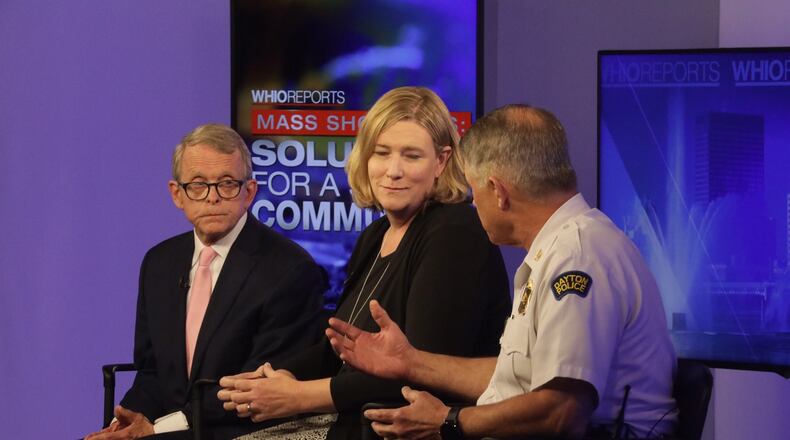Ohio Gov. Mike DeWine and Dayton Mayor Nan Whaley as well as police, mental health, medical and social service experts participated in an hour-long Dayton Daily News forum. “Mass Shootings: Solutions for a Safer Community,” will be re-played on News Center 7 at 12:30 p.m. Saturday.
The forum came one month after a 24-year-old man used an adapted semi-automatic weapon with more than 100 rounds of ammunition opened fire on the Oregon District, killing nine people and injuring 27.
RELATED: DeWine, lawmakers set to debate gun laws in wake of mass shooting
“We cannot forget. We have to have something positive come out of this tragedy. These individuals who died, there has to be something good out of that. As horrible, horrible as it is, it’s incumbent upon those of us in office to try to get something done,” DeWine said.
DeWine advocated for his 17-point plan for bolstering mental health treatment, increasing access to psychiatric beds in state hospitals, operating a tip line for school safety, expanding background checks to all gun purchases and adopting a “red flag” law that allows police or family to get a court order to temporarily seize weapons from someone who appears to be a danger to themselves or others.
DeWine noted that the “red flag” or personal protection order bill would help reduce suicides by gun, which account for 60 percent of all firearms deaths.
Whaley agreed with DeWine’s urgency to push for a package of changes before people outside of Dayton forget and move on to other issues.
“Time is of the essence on this, and so I appreciate fast action by the governor on these plans to work this as aggressively as possible through the (Ohio) Legislature,” Whaley said. “The people of the Dayton region are not going to forget this. This is an issue that has bubbled to the top for us when it comes to state legislative action.”
At the forum, Dayton Police Chief Richard Biehl talked about the importance of deploying, training and equipping police officers for quick response. His officers are credited with preventing Connor Betts from killing more people, responding in seconds when gunfire erupted.
Killed in the rampage were: Lois Oglesby, Nicholas Cumer, Logan Turner, Thomas McNichols, Derrick Fudge, Monica Brickhouse, Saeed Saleh and Beatrice Warren-Curtis and Megan Betts, the shooter’s sister.
Andy Rowe, manager of Blind Bob’s in the Oregon District, said the community support following the shooting has been overwhelming and he is heartened to see U.S. Rep. Mike Turner, R-Dayton, and DeWine, a Republican, advocating for reforms.
“They’re under a lot of political pressure. I don’t think they enjoy the political calculus. They want to see something change about this,” Rowe said. “It’s not a partisan issue. Something has to change. And if the governor puts his weight behind it, I think it can happen.”
Mass shootings and their traumatic aftermath grab headlines but represent just a fraction of firearms deaths in Ohio and across the country. Between 2007 and 2019, 16,374 people died by gun in Ohio, according to Ohio Department of Health data. Over the past decade, there has been nearly a 40 percent increase in firearms deaths in Ohio.
The Rev. Peter Matthews of McKinley United Methodist Church said that gun violence is an ongoing problem — noting that another Dayton man was shot just 12 hours before the mass shooting in the Oregon District.
Dr. Randy Marriott of Premier Health said that gun violence needs to be treated like a public health crisis. He also called for beefing up the mental health system and improving how information is shared to keep guns out of the hands of people with mental health issues.
Last week, DeWine outlined plans to improve the existing gun background check system.
About the Author

